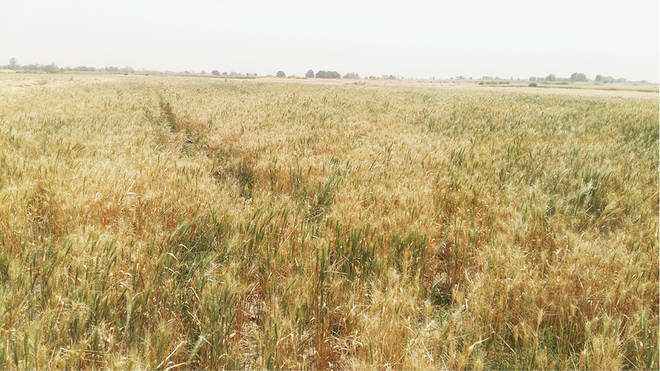
The production of wheat in Jigawa State dropped by about 65 percent this year, investigation by Daily Trust in the state has shown.
Multiple sources that spoke with our correspondent in the state attributed the ugly situation to pest’s infestation, late cropping and drop in the number of farmers as majority of them could not repay the loans for agricultural inputs distributed by the state government in the previous farming seasons.
Our reporter learnt that the state government had early this year stopped the loan scheme until full recovery of the previous disbursements was made.
Competent sources in the state told our reporter that defaulting civil servants, who engaged in farming last year and benefited from the loan, are now paying through a compulsory deduction from their salaries.
One of the sources said the authorities are at present working on how to handover defaulters that are not civil servants to the police for the recovery of the loan.
The state chairman of the Wheat Farmers Association, Abdullahi Waek, told Daily Trust that during the last farming season, over 12,000 tons of wheat was produced in the state but that the figure reduced drastically to only about 5,000 tons this year.
Though, defaulting in the repayment of the loan is largely the reason for the sudden sharp fall in the production of the crop, Waek also said late planting of the crop also contributed as many farmers planted late in January instead of October/November.
Daily Trust reports that last year, improved seed variety, pumping machines, fertilizer and other agricultural inputs were given as loan to the farmers by the state government under the agreement that they would pay back in cash shortly after harvest.
Repayment problem began when at the end of the harvest season, farmers realized that they would have to sell two bags of their farm produce before they could generate enough money to repay for one bag of seed they collected as loan.
‘’It is on this premise that the farmers, in contrast to the agreement of the loan, asked government to collect the produce in lieu of money. That will enable them to make repayment of one bag of seed with a bag of their produce but the government rejected the proposal,’’ the chairman of the state Wheat Farmers Association, Abdullahi Waek, explained.
Waek, said lack of knowledge on how to cultivate the crop also affected the farmers, noting that wheat was not cultivated on any kind of farm because unlike rice, it did not require too much water.
“Owing to these reasons, the population of wheat farmers also dropped from over 10,000 to about 3,000 across the state.
“Majority of civil servants, who defaulted, are now on compulsory repayment as deductions are being made from their salaries while for those that are not civil servants they will be handed over to the police to ensure full recovery.
“These are among what affected wheat farming in the state,’’ he explained.
Daily Trust further learnt that the issue of off-takers has also remained a problem for wheat farmers in the state, though the leader of the wheat farmers in the state said some flour mills have now indicated interest in the commodity, which gives them a ray of hope of better price.
The chairman of Wheat farmers in Ringim Local Government Area of the state, Hamisu Salisu Dabi, said the outbreak of pest on wheat crop this year affected the level of production in the local government, adding that a farmer that harvested 10 bags of wheat the previous season could barely get two bags this year.
Governor Muhammad Badaru Abubakar had told journalists in the state that the drop in production could be largely attributed to poor seeds; adding, however that government was working on how to produce its own seed for the farmers.

 Join Daily Trust WhatsApp Community For Quick Access To News and Happenings Around You.
Join Daily Trust WhatsApp Community For Quick Access To News and Happenings Around You.



